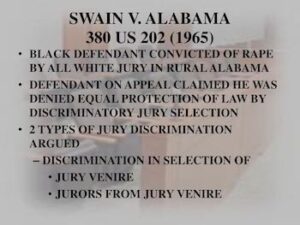
*On this date in 1965, Swain v. Alabama was decided. This case was heard before the United States Supreme Court regarding the legality of a struck jury.
Robert Swain, a Black man, was indicted and convicted of rape in the Circuit Court of Talladega County, Alabama, and sentenced to death by an all-white jury. The case was appealed to the Supreme Court, in part, on the ground that there were no Black jurors. Of eligible jurors in the county, 26% were black, but panels since 1953 averaged 10% to 15% Black jurors, and no Black juror had served on a petit jury since 1950.
In Swain's case, 8 of the 100 empaneled jurors were Black, but all were "struck" through peremptory challenges by the prosecution. Justice Goldberg authored a dissent, which Justice Douglas and Chief Justice Warren joined. This case recognized the peremptory challenge as a valid legal practice so long as it was not used intentionally to exclude Blacks from jury duties. The precedent set in this case was overturned in Batson v. Kentucky (1986).